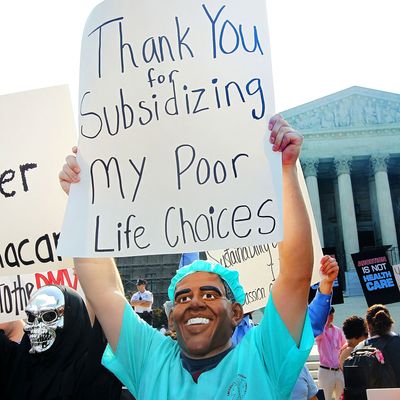
Most Americans like the idea of the government taxing the rich to give to the needy — at least, when it’s presented to them in the abstract. In fact, a majority of Republicans believe that the wealthy pay too little in taxes; that the government should “provide a decent standard of living for people unable to work, and ensure access to good health care”; and that the most recent addition to the American welfare state — Barack Obama’s expansion of Medicaid — should be preserved (so long as you don’t mention that “Obama” bit when you ask them).
This isn’t a new development. While American public opinion does fluctuate with events, a majority of American voters have consistently expressed support for progressive taxation and social welfare spending. Ronald Reagan did not win the presidency on the popularity of his fiscal policies: Even in 1979, amid runaway inflation that was widely attributed to excessive government spending, only 21 percent of Americans told the Opinion Research Corporation that the government was spending “too much” on “environmental, health, education, welfare, and urban-aid programs,” while 42 percent said “too little.”
The fact that there has never been a mass constituency in the United States (or any other Western democracy) for financing tax cuts for the rich by scaling back aid to the poor and working class has always been a problem for the conservative movement. But Republicans have long known a nifty trick for overcoming that obstacle to their regressive agenda: Get white Americans focused on their racial fears and resentments, and a lot of them will vote vote against the blacks instead of the plutocrats — and some will even come to believe that welfare programs don’t redistribute resources from the wealthy to working people, but rather, from diligent whites to indolent minorities.
A new study from sociologists at Stanford and UC Berkeley confirms the efficacy of this maneuver. During Barack Obama’s first term as president, the share of white Americans who expressed opposition to welfare rose sharply in surveys — as did the percentage who evinced high levels of racial resentment. To determine if there was a causal relationship between these developments — which is to say, if racial anxieties (ostensibly triggered by the election of a black president) were turning white Americans against welfare — the researchers designed a pair of experiments.
In one, they primed white respondents to contemplate the possibility that the United States will become a majority-minority nation within a half-century, by showing them a chart of U.S. demographic change — and then asked them about their views on welfare programs. In another, they provided respondents with demographic information about which racial groups benefit most from each safety-net program before gauging their support for such policies.
In both cases, the priming increased support for welfare cuts: When whites were encouraged to consider their racial group’s declining demographic dominance — and when they were alerted to the fact that African-Americans disproportionately benefit from certain social welfare programs — they became more receptive to “small government” conservatism.
This study does less to expose the motivations behind popular opposition to welfare programs in the U.S. (to the degree that such opposition exists), then it does to affirm what we have long known to be true. Its results will surprise no one familiar with the existing body of research on this subject — or with the last five decades of American political history.
Since Richard Nixon’s Southern strategy, a pillar of the conservative movement’s approach to electoral politics has been to capitalize on white racial backlash – and increase the salience of race in American elections, so as to decrease the salience of class, and thereby, make the Democratic Party’s reliance on African-American voters into a greater political liability than the GOP’s reliance on the wealthy and big business.
As the legendary GOP strategist Lee Atwater infamously observed:
You start out in 1954 by saying, “Nigger, nigger, nigger.” By 1968 you can’t say “nigger” — that hurts you, backfires. So you say stuff like, uh, forced busing, states’ rights, and all that stuff, and you’re getting so abstract. Now, you’re talking about cutting taxes, and all these things you’re talking about are totally economic things and a byproduct of them is, blacks get hurt worse than whites … “We want to cut this,” is much more abstract than even the busing thing, uh, and a hell of a lot more abstract than “Nigger, nigger.”
In 1980, Ronald Reagan launched his presidential campaign by extolling the virtues of “states’ rights” in Neshoba County, Mississippi — a place where that phrase was synonymous with the defense of white supremacy, and where the defenders of white supremacy had infamously lynched three civil-rights activists. In 1988, George H.W. Bush’s campaign worked tirelessly to portray Michael Dukakis as soft on black criminality — or, as Bush’s campaign manager Lee Atwater put it, to “make Willie Horton his running mate.” Twelve years later, Bush’s son would secure the GOP nomination with the help of a whisper campaign that painted his chief Republican rival as the father of an African-American child.
Many pundits attribute the sorry state of American politics in 2018 to the “polarization” of the electorate; to a partisan tribalism that has led voters to prioritize the triumph of their team over progress on broadly popular policy goals. Such commentators would do well to ask who benefits from the fact that tribal conflict inhibits the passage of majoritarian policies in the United States — and to consider the possibility that voters did not polarize themselves.






























